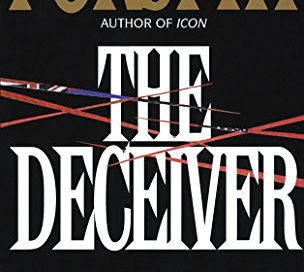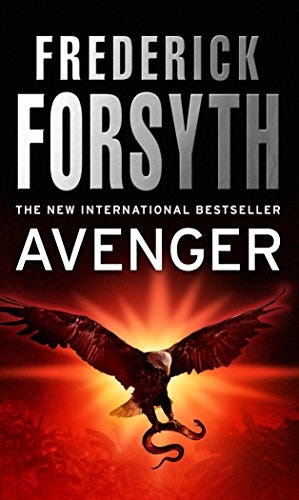Both the NY Times and Guardian obituaries focus on the first Frederick Forsyth novels from the early 1970s that made him a household name, The Day of the Jackal and The Odessa File.
No one seems to be making an argument that the author also improved over time, but perhaps they should be. In early 2024 I read The Deceiver (1991) and Avenger (2003). While I doubt I’d share many opinions with the late author when seated around a dinner table, Forsyth’s “I’m a failed imperialist!” perspective proved to be unexpectedly fresh and enjoyable when placed in the service of escapist entertainment.
What follows is a freshly-edited reprint of my thoughts from a year ago.
The Ian Fleming spy novels featuring James Bond was the first postwar series to catch fire. The audience was ready for this kind of casual espionage tale, where a handsome and rugged Englishman fought outsized enemies with fancy technology and bare fists.
John Le Carré’s dour world of subtle treachery was the original alternative. Some see the Le Carré tradition as more realistic than Fleming, but dumpy George Smiley is just as much of an aspirational figure as James Bond.
In the early 1970’s, Frederick Forsyth arrived on the scene with The Day of the Jackal. It was a new path: instead of joining the ranks of authors imitating either Fleming’s excitement or Le Carré‘s sophistication, Forsyth’s books read like a collection of after-action reports, displaying an immense amount of technical and geopolitical detail.
It was all true, more or less. Forsyth had served time in the military, had been a reporter on the ground in war-torn Biafra, and even took a turn as a low-level informant for MI6. The Day of the Jackal is told in two halves, with the first half being essentially journalism, the factual account of an attempt to assassinate Charles de Gaulle, while the second half is a fictional imagining of a follow-up assassination plot.
(The hit movie starring Edward Fox was better than the book; recent reboots have included a movie with Bruce Willis and a streaming series on Peacock.)
Forsyth’s second novel, The Odessa File, is also quite journalistic in nature and includes an appearance from genuine Nazi hunter Simon Wiesenthal. Apparently the film of The Odessa File even provoked the flight of real-life Nazi Eduard Roschmann from Argentina to Paraguay. (Wikipedia article.)
Forsyth wrote well, but perhaps not much more than that. If his novels are receding from collective memory, it may be simply because Forsyth tries hard to tell the truth, like any good reporter should, and the result can be a bit dry. (The true greats in this field keep me up all night, whereas it is pretty easy to put down a Forsyth when it’s time to go to sleep.)
Still, Forsyth holds an important place in the canon, and he was also reasonably prolific. Last year I judged it was time to look at two later novels, The Deceiver and Avenger. Somewhat to my surprise, they were both much better than The Day of the Jackal or The Odessa File.
(While The Day of the Jackal is one of the great titles of all time, at some point Forsyth settled in and produced a shelf of books with similar and hard-to-remember names: The Shepard, The Negotiator, The Deceiver, The Veteran, Avenger, The Afghan, The Fox. This uninspired choice may suggest to the casual observer that the author just churned out the same book over and over, but that’s not true: The ones I’ve read are all quite different from each other, built from the ground up with fresh research. The Shepard is a true outlier, being a splendid illustrated ghost story for young adults.)
The Deceiver (1991) is a nice addition to the short list of worthy postwar novels recounting straightforwardly pro-British tales of espionage. The book is actually comprised of four long short stories connected by a hero, retiring SIS officer Sam McReady. These plots were first filmed for television as Frederick Forsyth Presents. I haven’t seen those episodes—as far as I know they are obscure—-but perhaps Forsyth was inspired by the brilliant Ian Mackintosh television production The Sandbaggers. If you like The Sandbaggers, you’ll want to track down the easy-to-find The Deceiver, it is very much in that sort of idiom, where internal Whitehall politics do their best to get in the way of justice.
Forsyth is a patriot through and through, and there is never any doubt that our hero is doing what is required for Queen and country. However, like all good military men, the author also sympathizes with the other side. The conclusion of “The Price of the Bride” suddenly sees the conflict from the opposing viewpoint, and the result is moving.
In Avenger (2003) Forsyth takes his reporter’s eye to America, although there’s also a long episode set in Vietnam during the war, and quite a lot about the Bosnian conflict. Our hero this time is Calvin Dexter, the avenger of the title. This ex-military New Jersey lawyer is essentially a stock vigilante character, but Forsyth works hard to make Dexter somewhat plausible. Now in his fifties, Dexter has trouble still doing his triathlon, and after he leaves home and goes undercover to stalk his prey, every quotidian routine is listed and explained.
The trolley problem—whether to sacrifice one or few to save a larger number—is a standard ethical question in escapist entertainment. In Avenger, Forsyth wants us to love and support the hero, and expends much literary effort painstakingly setting up the backstory of every character in order to make a final Mission: Impossible-style confidence trick seem “possible." (Again, there can be something a bit unstylish about all this; at times reading Forsyth feels like reading a newspaper.)
Since the history of the story is real history—some of the characters are even real people—it turns out our hero’s victory provokes a much greater loss. The final pages of Avenger are unexpectedly complex, and perhaps even turn the book into a minor masterpiece. A good reminder: There’s a lot of escapist creativity to be explored and exploited in stories that lack an easy definition of right and wrong.





Thanks. I've got your previous recommendation, Charlie Huston's "Skinner", on my nightstand now. Keep 'em coming.
Have you checked out Mick Herron? He is great